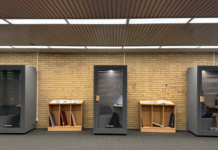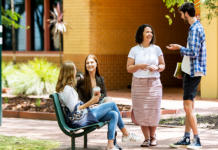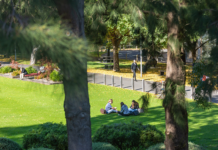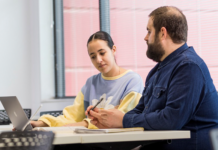Content warning: This article discusses sexual harm, including sexual assault and sexual harassment. If you are currently in distress, please contact 1800 RESPECT (1800 737 732) for support. If you are in immediate danger, call 000.
When someone tells you they’ve experienced sexual harm, it can be confronting. You might be unsure what to say or how to respond. Here are some tips on what you can do if someone discloses to you that they’ve experienced sexual harm.
- Listen – Hear what they say and try not to interrupt. Let them talk at their own pace and show them you’re listening. Make eye contact, nod, and don’t worry if they stop talking for a while – silences are okay.
- Believe – Try not to overdo the questions because this can make it seem like you doubt their story. It’s important that your friend sees you’re on their side and that you support them.
- Validate – Tell your friend that what they’re feeling is valid. Let them know you think their feelings are real and normal by repeating the feeling word they’ve used (e.g. ‘it’s okay that you feel scared’). Acknowledge that you have feelings about it too but try to keep the focus on your friend.
- No blame – Unfortunately, in our society, it’s not uncommon for victims to be blamed for their experience of violence. Try to avoid questions such as ‘Why did you go there?’ and ‘Why did you go out with him?’ because they might make your friend think they’re responsible for what happened.
- Ask – If you feel a bit helpless, ask your friend what sort of help they’d like from you. They’re not expecting you to solve the problem, and you’ve already done a lot just by listening. Asking will also help your friend think about what to do next. It’s important that your friend trusts you and feels like they’re in control of their experience. If you think someone else needs to know (e.g. a lecturer/tutor or other trusted adult), tell your friend first. Together you can think about who can be trusted, but only tell them when your friend is okay with it.
- Get help – Talk with your friend about what would help stop the behaviour (if it is still happening), or what they feel they want to do. Encourage your friend to contact La Trobe’s Safer Community Service or the Health, Wellbeing and Inclusion student support teams who can support your friend to make decisions and understand options.
What is La Trobe’s Safer Community service?
Safer Community is a free, confidential support service for students and staff who experience concerning, threatening, inappropriate or uncomfortable behaviour, including sexual harm. Safer Community will listen, believe and support you, and will work with you to help you decide on a course of action that is right for you.
Safer Community will tell your friend up front what types of disclosures might trigger formal processes (such as misconduct or workplace behaviours policies). If after disclosing, your friend decides to make a formal report, they will not be forced to participate in any subsequent formal processes the university takes. Safer Community can put in place arrangements that keep your friend and the community safe.
Contact Safer Community:
- Fill out our form
- Call: (03) 9479 5308
- Email: safercommunity@latrobe.edu.au
Support for yourself
You can also seek support for yourself. Helping someone after sexual harm can be challenging and distressing. La Trobe’s Health, Wellbeing and Inclusion division has a range of services that can support you as a friend, including counselling and wellbeing mentors. You can also contact Safer Community just to seek advice.
















